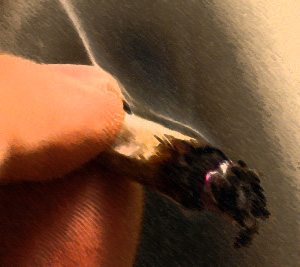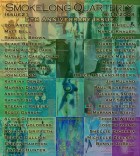I have to admit that I went into reading this prepared to reject—the title immediately set me back on my heels. But it’s critical, I think, to the story that follows. In writing this, were you nervous at all about whether the piece would be “acceptable” to an audience?
Nervous? Hard to say. At this point I’m new to the game and I just assume that everything I write will be rejected. I check my mail box three times a day for rejection notices. Twice on Sundays. I decided on the title of the piece before I began the draft. I understood that certain people would be turned off by it, but it’s like the Bible says, “Woe unto you, when all men shall speak well of you!”
The first paragraph really surprised me—it didn’t seem to be part of a story with a title like this. Of course, it’s integral (as is the title) to the story that follows. Do you think the piece would carry the same weight if only one or the other of the two major threads (the loss of job and the pornography) had been explored?
I think this story works on an action/reaction model. A man loses his job and falls into an unsavory roll. It’s basically a flash tragedy. You could tell an interesting story without one of the threads, but it wouldn’t have the same effect. There wouldn’t be the same implications.
It seems particularly appropriate to tell this story right now, in light of the current economy. I don’t want to diminish the humanity of the piece by referring to it as political, but… it is, in fact, a somewhat political piece. As a writer, how important do you believe it is to engage in the political, to comment (however subtly) on the state of the world?
Yeah, I was definitely trying to make a bigger statement with the piece. America has basically outsourced everything but entertainment, and our society reflects this at all levels. Everyone I know has put pictures of themselves on the internet, but I only know three people who can change the motor oil in their cars. That’s pretty fucked up. But I think it’s the writer’s job to let the state of the world inform the piece. Anything else seems like diatribe.
While reading, I kept thinking back to Steve Almond’s quote saying, “We should love our characters not for their nobility and strength, but for their iniquity and weakness.” Nothing in “We Decided to Make Porn” flinches from any of the characters’ unattractive traits, and yet I get the sense that you care quite a bit about them. True?
Of course. Bring on the flaws. The only thing I like more than flawed characters is sipping single malt Scotch during my AA meetings.
As a teacher of writing, what is the single most important thing you want your students to learn?
Shit. I teach life skills to severely challenged students. The single most important thing I want my students to learn is how to write their names. When they do I dance around and buy every one ice cream. Then I read them Wallace Stevens.



 Included in the price of SmokeLong Fitness:
Included in the price of SmokeLong Fitness: